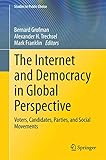The internet and democracy in global perspective : voters, candidates, parties, and social movements/ Bernard Grofman; Alexandre H Trechsel; Mark Franklin
Language: eng Series: Studies in public choice (Springer-Verlag), volume 31Publication details: New York: Springer, 2014.Description: 148 p.: ill.; 24 cmISBN:- 9783319043517
- JC 423 I61 2014
| Item type | Current library | Home library | Collection | Shelving location | Call number | Copy number | Status | Date due | Barcode |
|---|---|---|---|---|---|---|---|---|---|
 Libro
Libro
|
Biblioteca Juan Bosch | Biblioteca Juan Bosch | Ciencias Sociales | Ciencias Sociales (3er. Piso) | JC 423 I61 2014 (Browse shelf(Opens below)) | 1 | Available | 00000143958 |
Browsing Biblioteca Juan Bosch shelves, Shelving location: Ciencias Sociales (3er. Piso), Collection: Ciencias Sociales Close shelf browser (Hides shelf browser)

|

|

|

|

|

|

|
||
| JC 423 I61 1997 The international IDEA handbook of electoral system design | JC 423 I61 2008 International perspectives on contemporary democracy / | JC 423 I61 2012 Internet y el futuro de la democracia / | JC 423 I61 2014 The internet and democracy in global perspective : voters, candidates, parties, and social movements/ | JC 423 I68h 2009 El humanismo cívico : una invitación a repensar la democracia / | JC 423 I73 2009 Is democracy exportable? / | JC 423 I73d 1998 Democracy in dark times / |
Preface --
Acknowledgments --
Introduction --
Internet Voting in a Local Election in Canada --
Indirect Campaigning: Past, Present and Future of Voting Advice Applications --
Digital Media and the 2010 National Elections in Brazil --
Online Campaign Communications (Facebook, Twitter, and Websites) in the 2010 UK Elections --
Virtual Power Plays: Social Movements, Internet Communication Technology, and Political Parties --
On the Role of Texts, Tweets, and Status Updates in Nonviolent Revolutions --
Bibliography --
Index.
This volume provides an important update to our current understanding of politics and the internet in a variety of new contexts, both geographically and institutionally. The subject of e-democracy has morphed over the years from speculative and optimistic accounts of a future heightened direct citizen involvement in political decision-making and an increasingly withered state apparatus, to more prosaic investigations of party and governmental website content and micro level analyses of voters' online activities. Rather than levelling the communications and participation playing field, most studies concluded that existing patterns of bias and power distribution were being repeated online, with the one exception of a genuine change in the potential for protest and e-activism. Across all of these accounts, the question remains whether the internet is a levelling communication tool that elevates the profile of marginalised players in the political system, or whether it is a medium that simply reinforces existing power and participatory biases. While employing case studies from various global perspectives, this book investigates the role of digital media and competitive advantage, campaigns and the effect of social media, online communication as way of fomenting nonviolent revolutions and the undeniable and important role of the internet on democracy around the world


There are no comments on this title.